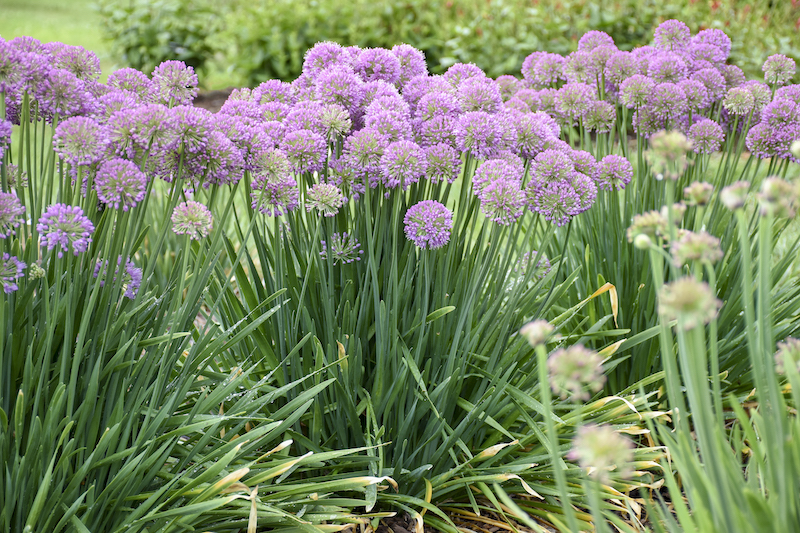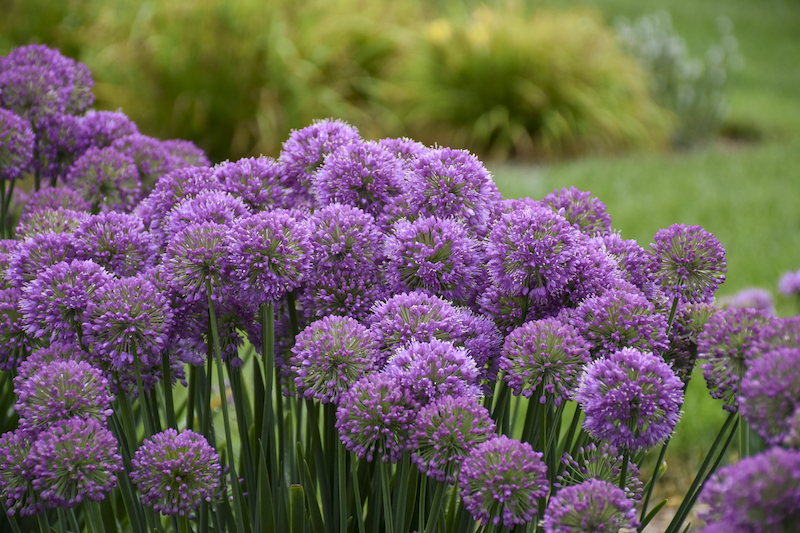Ornamental and edible alliums have similar growing habits and looks, although they have different fertilizer needs. Edible alliums include common produce crops such as onions, leeks and garlic. These crops need more supplemental feeding so they can grow to their optimum size in time for harvesting. The planting soil may need an annual boost of nutrients because the previous crop depleted them.
Ornamental alliums are grown like a bulb and may only need supplemental fertilizing at planting time and once during the growing season. Ensuring proper watering, planting, and winter care are the best ways to help the ornamental cultivars bloom the best.

How to Fertilize Alliums
Alliums will grow in most soil pH levels. Extremely acidic or alkaline soils may need to be amended to bring them closer to neutral. Application of a slow-release, granular fertilizer is beneficial for both ornamental and edible alliums. The food is available as the plant grows and only needs to be applied to the soil early in the spring. Edible alliums also appreciate a diluted liquid feed as the growth begins to take off early in their growing season. Leeks and garlic in particular need the extra boost of a liquid seaweed or fish emulsion when their foliage gets 6-8 inches tall. Always follow the manufacturer's instructions on the label.
Best Time To Fertilize Alliums
Ornamental alliums will benefit from a scattering of granular fertilizer in the bottom of the planting hole the first year. This will help the roots grow strong and establish quickly. Edible alliums also appreciate a granular, slow-release fertilizer mixed at planting. Supplemental feeding during the growing season is only needed for the edible alliums.

Best Fertilizer For Alliums
Slow-release, granular fertilizer is the best type of feed for both edible and ornamental alliums. It will supply nutrients all season long. The edible alliums will benefit from a balanced fertilizer like a 10-10-10 NPK formulation to support strong growth. Extra nitrogen is often needed for soils where produce is grown regularly, depleting the reserve of nutrients each year. A diluted liquid feed of seaweed or fish emulsion will give the crops an extra boost for maximum growth at mid-season.
Ornamental alliums will need a fertilizer that has the right nutrient balance for bulbs. A higher P (phosphorous) number will support vigorous blooming and bulb growth. Dr Earth and Espoma both make fertilizers specifically for bulbs that are easy to use.
Allium Fertilizing Tips
- Edible and ornamental alliums need different amounts of fertilizer
- Edible Alliums will need a higher amount of nitrogen than the ornamentals
- Slow-release, granular fertilizer is applied at the beginning of the growing season to support ornamentals all summer
- Ornamental alliums may not need supplemental feeding every year
Warnings
-Always wear protective gloves and a face mask when handling chemical fertilizers.
-Closely follow all directions and storage guidelines that are on the fertilizer label.
 |
Author Robbin Small - Published 7-19-2022 |
